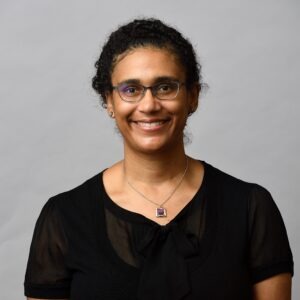This post is part of a series on the Ralph O’Connor Sustainable Energy Institute (ROSEI) website that will feature Q&A’s with our affiliated researchers. Next up is Dennice Gayme, an associate professor in the Department of Mechanical Engineering who also serves on ROSEI’s leadership council.
How did you first get involved with or learn about sustainability?

Dennice Gayme
Dennice Gayme (DG): Most of us are taught in elementary school to value the planet and such, so I used to force my family to do things like recycle. More formally, I became more interested in sustainability as an undergraduate at McMaster University. I pursued a five-year degree called Engineering and Society, which is only offered at McMaster, and I was actually on the student advisory board that helped the program get accredited. We took courses on sustainability, sustainable development, technology and society and other aspects of engineering. A lot of the things I learned about sustainability I learned from that program.
Why are you passionate about sustainability/renewable energy?
DG: That it is possible to make a difference, and the more you learn about the field the more you learn that what people once thought were impossible actually are possible, which I find very exciting. The economics of it have also improved, it is now widely accepted that there are good economic reasons to pursue these sustainable options. This makes it easier to explain the why to those who are not traditionally interested in environmental concerns and expands the number of people willing to invest in these areas. The progress of the field has been exciting because you are no longer fighting that these efforts are possible, people now accept that they can and should be done.
How does your commitment to sustainability play out in your everyday life?
DG: I think there are small things we all can do, like trying to reduce waste, making sure to recycle, and trying to reuse as much as possible. The world is so different than when I was growing up because now you have so many more avenues to pursue sustainable options. Just earlier this week I was looking to buy a blanket and came across one that was made from material scraps, which is great for the environment because you aren’t throwing that stuff away.
Tell us about your research, and what aspects currently or in the future tie into sustainable energy efforts?
DG: Much of my research is on turbulence and network systems. My network systems research is centered around about operating the power system more efficiently, which is related to sustainability. Understanding turbulence and flow control is also about fuel efficiency. If you can do that you can use fuel more efficiently, which saves energy.
Is there an article, book or podcast that people can check out to help better understand the area you work in or your specific work?
DG: There are a few, which can be read below:
- New model more accurately predicts the power of wind farms
- Trying to catch the wind: Research project aims to make offshore wind farms more efficient, powerful
- Researchers seek better ways to harness the power of wind
What advice or suggestions do you have for students who want to pursue careers in sustainable energy?
DG: I have had a countless number of students who reach out to me about wanting to work in sustainable energy, but they have no idea what that means, or what type of skills it involves. it’s a huge field and depending on your interests you could be interested in a variety of aspects of it. So, it’s a really good idea to get a basic overview of the space before deciding what area you want to pursue.
How has the creation of ROSEI affected sustainable energy efforts at Hopkins?
DG: I think ROSEI put emphasis on these areas and shown it is important at Hopkins. It has already brought together people who maybe previously would say they should talk about collaborating, but now actually are. We now have a concerted effort around hiring more people who work in these spaces, which increases the collaboration opportunities and raises the visibility of this work at Hopkins. ROSEI strengthens our credibility as a university that focuses on sustainable energy. It has also been important for students who are increasingly interested in these areas, now they have a place where many of these efforts are highlighted to help them figure out how to get involved. I think it will also help in recruiting the best students who want to make a difference.